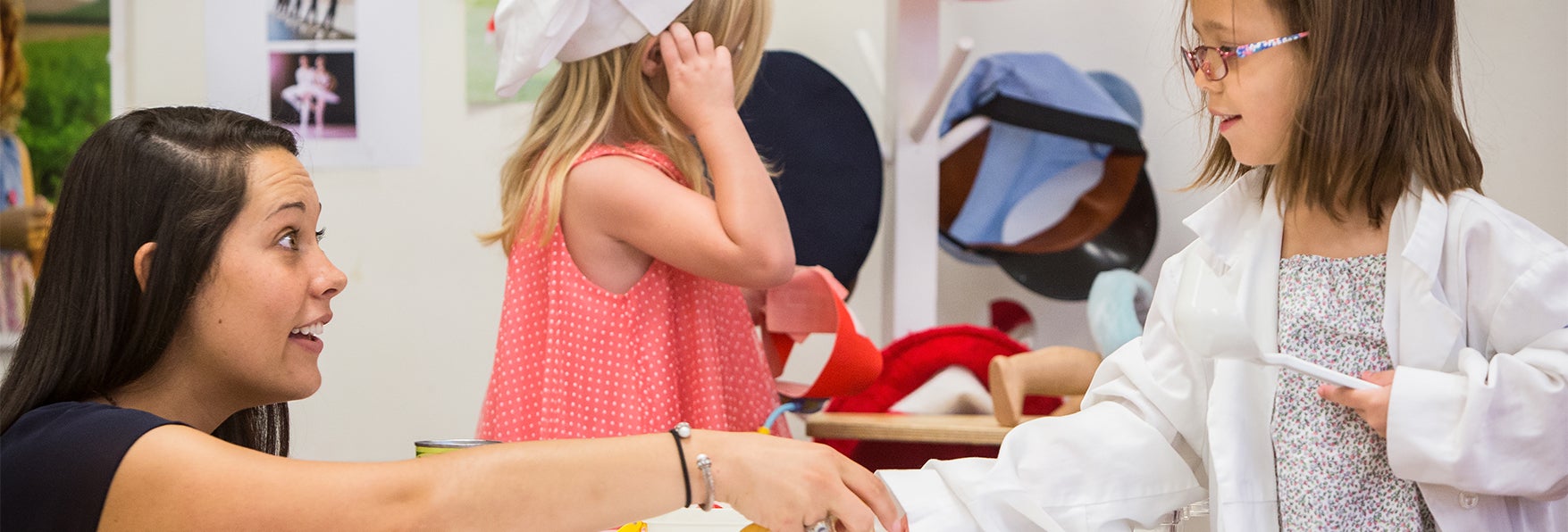BS Birth Through Kindergarten Teacher Education
Do you have a love for young children? Are you interested in teaching preschool, working with families or with early intervention programs?
The birth through kindergarten teacher education program at East Carolina University explores the careers of those who care for and teach young children. Students within the BK program work with all young children, including those who are at risk and/or have disabilities. There are many career outlets that follow a BS in birth through kindergarten including the public school system, other education centers, and early intervention facilities. Students who attend East Carolina University in pursuit of a BK degree find that they are well prepared for their future careers as they undergo extensive training and course work to achieve their goals.
At East Carolina, the birth through kindergarten program can be accessed on campus as well as online for those who wish to be considered distance education students. As a student in the birth through kindergarten teacher education program, you will be exposed to real-world situations through hands-on experience to better prepare you for a career in the field.
You will learn first-hand how to care for children by learning and training in the Nancy W. Darden Child Development Center, a fully operating preschool designed to equip our students for a career in early child development. Students in the online program complete hands-on experience in centers and schools near their hometown. Before graduating, you will complete a yearlong student teaching internship in a preschool or kindergarten setting. Doing so will give you a taste of the exciting career path that you will embark on upon graduating from East Carolina.
Admission Requirements
- Freshman and transfer students may declare BK as their intended major.
- Prior to enrolling in certain courses students must be admitted to Upper Division in Teacher Education, the official step in applying for and being formally admitted into a teacher education program.
- Upper Division Requirements: 2.7 GPA; passing score on PRAXIS CORE, SAT, or ACT; and successful essay and interview with faculty
Program Requirements
Delivery Methods
This program is offered in both an on-campus, Face to Face format and off-campus, on-line format. Please note that the on-line program is only open to residents of North Carolina.
Additional Information
The BK program requires practicum with the following methods courses (2123, 2124, 3321, 4121, 4122, 4123, 4200, 4201, 4300). These are completed in early childhood settings in non-public programs and public school. Practicum experiences are opportunities for students to apply content and gain hands on experience with young children. The BK program culminates in a year-long internship experience in a publicly funded program. Students complete Internship 1 during the fall semester of their final year of courses and are in their placement one day a week. Students complete Internship 2 during the spring semester of their final year and are in their placement five days a week. Schools located in the Latham Clinical Network are available for practicum and internship experiences in Eastern North Carolina. For students in the distance education program we support internship and practicum experiences across the state.
Uniform Articulation Agreement in Early Education (AAS to BS in BK/Early Childhood related programs)
The Uniform Articulation Agreement focuses on seamless transfer for Applied Associates in Science in early childhood education (ECE) students matriculating from the North Carolina Community College System to the constituent institutions of the University of North Carolina in order to complete a Bachelor’s Degree in Birth-Kindergarten teaching licensure program or a Bachelor’s Degree in a related Early Education non-licensure program.
Uniform Articulation Agreement in Early Education
ECU BK Comprehensive Articulation Transfer Guide
Accreditation Information
At ECU, teacher education programs are accredited by the Council for the Accreditation of Educator Preparation (CAEP) and the North Carolina Department of Public Instruction (NCDPI). Additionally, our program is accredited through the American Association of Family & Consumer Sciences (AAFCS).
The following information applies to all ECU programs that lead to a license to work in any level in public schools, i.e. teachers, principals, librarians, social workers, school counselors, superintendents, etc.
Upon successful completion of educator preparation program degree requirements and licensure requirements for the State of North Carolina, such as, but not limited to, testing and national assessments, candidates will be eligible for an ECU recommendation for a NC license. However, final licensure granting decisions are the sole responsibility of the North Carolina Department of Public Instruction not ECU. Candidates who graduate and seek out of state employment will have to meet the receiving state’s requirements for licensure. There is no automatic licensure reciprocity between states. ECU will verify the completion of an approved, accredited program for candidates who seek employment out of state, and those candidates will be responsible for working with the receiving state to complete any additional requirements needed to obtain the license for employment.
